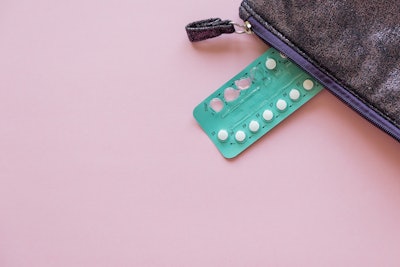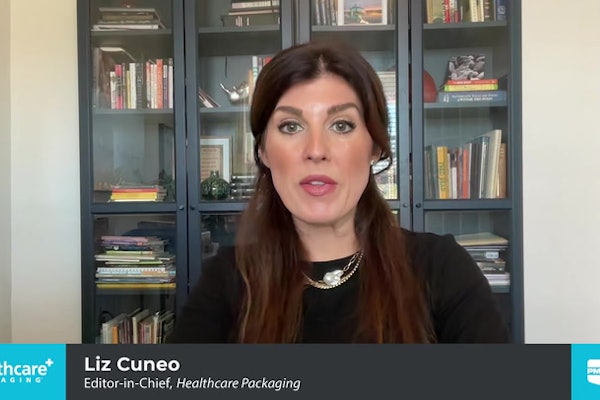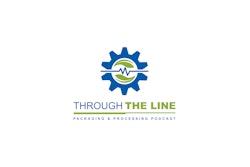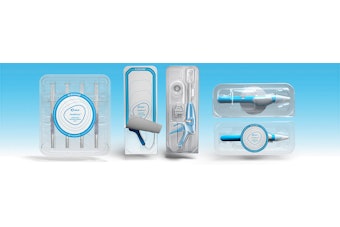With U.S. patients facing long wait times, stigma, and accessibility issues, a number of digital primary care companies have launched in the last five to 10 years to fill needed gaps in healthcare. Digital/telehealth appointments and medication delivery by mail offer a needed direct-to-consumer (DTC) channel for sexual and reproductive health for patients without insurance, those seeking convenience, people with limited mobility, and more.
Launched in 2016, Favor (formerly The Pill Club) began as an at-home delivery service for birth control. Its mission is to make healthcare more accessible by building digital primary care that closes gender, socioeconomic, and racial gaps in our current health system. The company delivers birth control, emergency contraception (also referred to as EC throughout the story), menstrual care, and skincare.
The Department of Health and Human Services (HHS) has acknowledged the importance of telehealth for family planning and preventive health services. In May of this year, the HHS awarded $16.3 million in grant funding to support 31 grantees to enhance and expand the telehealth infrastructure and capacity of Title X family planning clinics in 26 states, one U.S. territory, and one freely associated state.
wisp launched in 2018 to provide healthcare and fast, easy, affordable treatment—free of judgment. “At wisp, we believe sexual and reproductive healthcare has been stigmatized and overlooked for far too long. For patients, it’s often frustrating, uncomfortable, and expensive to get the care required, leading many to avoid treatment of these non-life-threatening conditions altogether,” says Monica Cepak, chief marketing officer at wisp.
With a ruling as sweeping as the Dobbs v. Jackson decision on June 24, 2022, which overruled both Roe v. Wade (1973) and Planned Parenthood v. Casey (1992), many patients are concerned about access to vital reproductive healthcare. While manufacturers maintain supply for these needed prescription drugs, what about the last mile? We talked with representatives from Favor and wisp about their transport packaging, the hurdles that lie ahead, and upholding their accessibility missions in a time of fear and concern among patients.
Discreet packaging
Discreet packaging has been a hallmark for both companies in delivering birth control or EC by mail, so sudden packaging changes were not required for mailers this summer.
“We do not need to make any packaging changes in light of the Dobbs ruling. Given the personal nature of having birth control and emergency contraception delivered to patients' doorsteps, Favor's packaging has always been and will continue to be discreet,” says Sarah Abboud, director of communications at Favor.
To provide judgement-free healthcare, wisp’s Cepak explains, “Our packaging for products, such as birth control and emergency contraception to herpes and BV [bacterial vaginosis] medication, have always been shipped in discreet packaging. Since we’ve prioritized discretion since the start, we don’t plan to change our birth control or emergency contraception packaging at this time.”
wisp’s Artist Partnership program makes a splash once the mailer is opened. “We will continue to feature designs from diverse artists on the inside of our packaging, furthering our goal of making healthcare more accessible and inclusive,” says Cepak. “Following a recent collaboration with San Francisco-based illustrator and designer Allie Sullberg, we introduced a new, limited-edition artist design [at the end of June] from Laxmi Hussain, a London-based artist who celebrates the uniqueness of all bodies through her art. We’re thrilled to continue to share unique perspectives through this program.”
Birth control packaging at the forefront: Read from the National Museum of American History about how birth control medication sparked sweeping innovation in patient adherence packaging, notably the DialPak.
Handling demand spikes
Birth control and EC (such as Plan B, introduced by Duramed and approved for sales by the FDA in 1999) are still legal in all 50 states, and business will continue as usual, says Abboud.
But demand surges for drugs can often cause shortages—particularly with major nationwide news. In the summer of 2020, needed ventilator drugs, PPE, and more were in short supply as COVID-19 raged.
Favor and wisp both have been able to meet surges in demand. Cepak says wisp, which operates in all 50 states, is not experiencing supply issues at the moment, however as demand increases nationally this could change in the future.
With the SCOTUS case looming, wisp was prepared to see increased demand in their EC and birth control solutions. “Following the leak of the verdict in May, wisp saw a 40% surge in sales of emergency contraception products and services over the previous month,” says Cepak. “This spike was especially concentrated in some of the states with ‘trigger laws,’ including Wyoming, Missouri, Arkansas, and Oklahoma. Florida and Texas—two of wisp's largest states—also saw higher than average increases in sales of emergency contraception.”
Ahead of the final ruling, wisp expected another spike in sales, and planned operations accordingly. “On Friday, June 24th when the decision was released, wisp observed an unprecedented 30x day-over-day spike in emergency contraceptive sales, which was 25x the daily average for May, and has since continued to see day-over-day growth. Our team has been able to meet demand, and does not expect to limit purchases.”
Favor also experienced staggering spikes. “In the 72 hours following the Dobbs ruling on June 24th, we saw a 5,000%+ jump in EC-only orders. We also saw account creation for Favor's birth control services spike, with thousands of new patients signing up at heyfavor.com. As of today, Favor has sold EC in all 49 states where we operate,” explains Abboud.
She adds that with some big box pharmacies enacting purchase limits for EC in anticipation of a shortage, Favor is ready to step in for consumers’ needs, supporting up to 10 boxes per order, and consumers can place multiple orders. “We've spoken with our EC manufacturer, and they do not foresee a shortage at this time,” says Abboud.
Further challenges in patient outreach
With birth control medications so common among young adults, outreach via social media is common sense—but this represents an ongoing challenge. “While the SCOTUS case inspired many to learn more about their reproductive health and the care accessible to them, there’s still a lot of education needed around reproductive health, and specifically emergency contraception and birth control,” says Cepak. “However, advertising platforms, such as TikTok, Facebook, and Google, have complicated many of our efforts to spread awareness of critical sexual and reproductive concerns and solutions. For example, last month TikTok prohibited wisp from running ads for emergency contraception and herpes medication. This presents a real hurdle as many seeking care may not be aware of the options available to them.”
Forging ahead
Both brands will continue to address shortfalls in U.S. healthcare. “We believe that effective and accessible reproductive healthcare is everyone’s right,” says Cepak. “The reversal of Roe v. Wade hasn’t changed our day-to-day operations. We will continue to provide access to fast, effective, and affordable reproductive and sexual health care and seek counsel from our team of esteemed medical advisors along the way.”
Abboud notes, “A post-Roe world already has major implications for the millions of people who receive birth control from abortion providers. Digital birth control provision and delivery providers like Favor can help reach people whose clinics are closing, those who are facing increased stigma in receiving care as well as safe-haven states managing surges in contraceptive demand. Digital health will only become more critical as the emboldened anti-abortion movement pivots to erode birth control and emergency contraception access.”






















